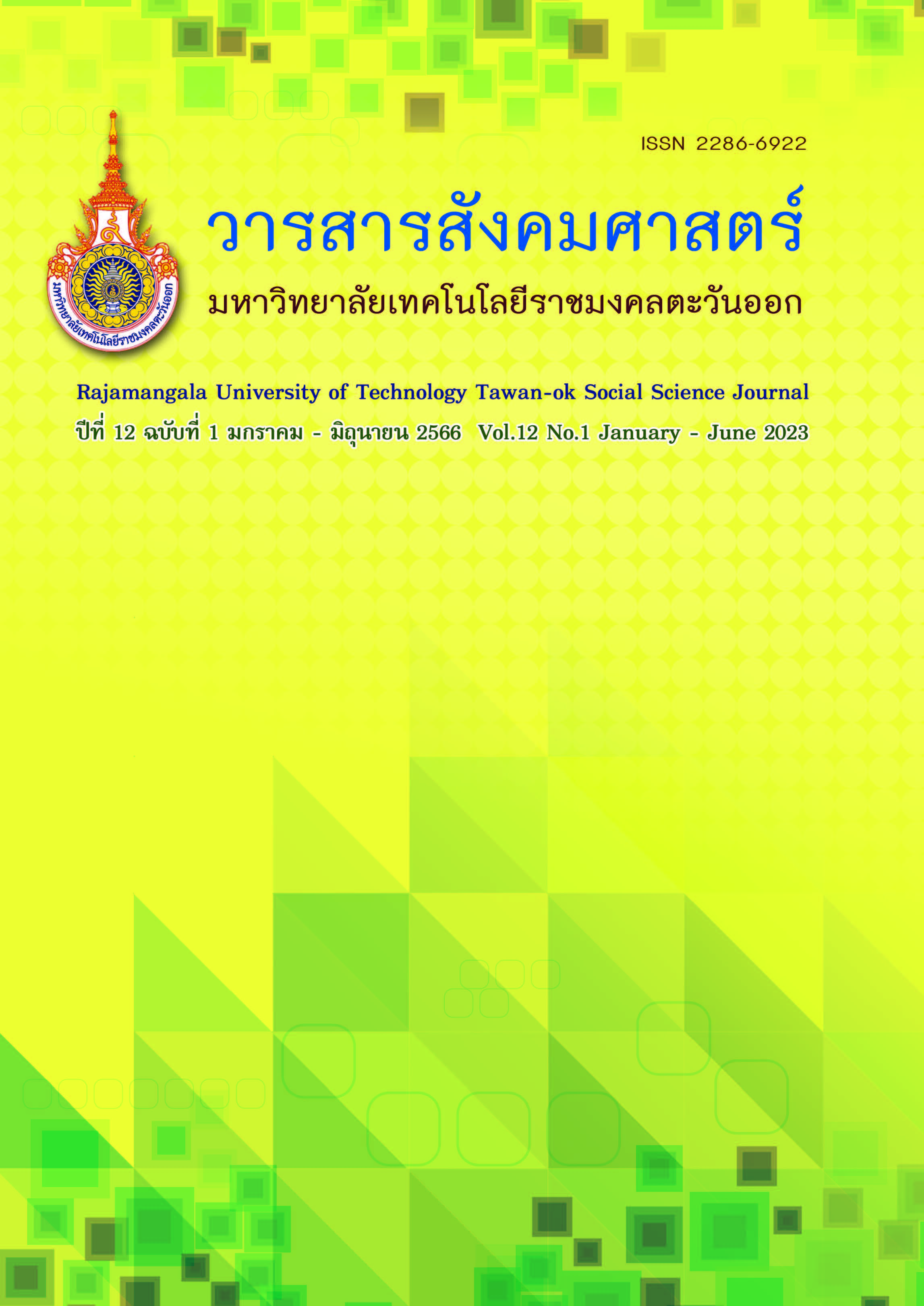Socio-Psychological Impact on Online Learning Behaviors of Chiang Mai Rajabhat University Students: Late Phase of COVID-19 Pandemic
Main Article Content
Abstract
This cross-sectional research was to study the sociopsychological impact of the COVID-19 pandemic on online learning of Chiang Mai Rajabhat University students. The participates were undergraduate students from all years of 5 faculties and 2 colleges, including, Faculty of Education, Faculty of Agricultural Technology, Faculty of Humanities and Social Sciences, Faculty of Management Sciences, Faculty of Science and Technology, International college, and Mae Hong Son College, who have completed online learning in the academic year 2020 - 2021, totaling 489 students. The research tool was an online questionnaire. Data were analyzed using binary logistic regression. The results revealed that female students were more than male students. Most of them studied online by using a smartphone through the internet of a mobile phone directly. The top 3 online learning barriers are internet signal instability, unavailability of equipment for online learning, and interference from people who live together while studying online. Psychological factors found that students' anxiety in online learning was at a moderate level. The level of attitude towards online learning was at moderate level. The adaptation to online learning was at a high level. As for social factors, it was found that the influence of peers on online learning was at a high level. The average physical environment towards online learning was at a high level. The perception of social norms toward online learning was at a moderate level. The average overall online learning behavior was at a moderate level. Socio-Psychological impact of the COVID-19 pandemic effect on the online learning behavior of students found that the psychological factors in all 3 sub topics were students' anxiety in online learning, attitude towards online learning, and adaptation to online learning had a statistically significant effect on the online learning behavior of students. (p-value = 0.01, ≤ 0.001, and 0.05, respectively). Meanwhile, social factors in 3 sub-topics: influence of peers on online learning, physical environment towards online learning, and perception of social norms had a statistically significant effect on the online learning behavior of students (p-value = 0.05, 0.003, and 0.01 respectively).
Article Details

This work is licensed under a Creative Commons Attribution-NonCommercial-NoDerivatives 4.0 International License.
References
กรรณิการ์ แสนสุภา, เอื้อทิพย์ คงกระพันธ์, อุมาภรณ์ สุขารมณ์, และ ผกาวรรณ นันทะเสน. (2563). การปรับตัวของนักศึกษาในสถานการณ์โควิด-19. วารสาร มจร. มนุษยศาสตร์ปริทรรศน์ 6(2) : 79-92.
เกศริน วงษ์มั่น. (2553). ผลการใช้โปรแกรมการกำกับตนเองที่มีต่อการมีวินัยในการเรียนของนักเรียนช่วงชั้นที่ 3 โรงเรียนศรีนภเขตวิทยา สังกัดสำนักงานพระพุทธศาสนาแห่งชาติ จังหวัดนครสวรรค์.ปริญญาการศึกษามหาบัณฑิตสาขาวิชาจิตวิทยาการแนะแนว. มหาวิทยาลัยศรีนครินทรวิโรฒ.
กองนโยบายและแผน มหาวิทยาลัยราชภัฏเชียงใหม่. (2564). จำนวนนักศึกษา ประจำไตรมาส 3/2563 ข้อมูล ณ วันที่ 1 สิงหาคม 2563. http://www.plan.cmru.ac.th/dataset/ std.php. สืบค้น วันที่ 18 มกราคม 2565.
ชฎาภา ประเสริฐทรง, จรินวรรณ แสงหิรัญรัตนา, และพรชนา กลัดแก้ว. (2564). ปัจจัยที่มีความสัมพันธ์กับความเครียดในการเรียนออนไลน์ จากสถานการณ์โควิด-19 ของนักศึกษาพยาบาล. วารสารสถาบันจิตเวชศาสตร์สมเด็จเจ้าพระยา 15(1) : 14-28.
ณัฐปคัลภ์ แซ่เอี้ย. (2564). พฤติกรรมการตั้งใจเรียนออนไลน์ในสถานการณ์โควิด-19 ของนักศึกษามหาวิทยาลัยศิลปากร พระราชวังสนามจันทร์. (การวิจัยรายบุคคลปริญญาบัณฑิต). มหาวิทยาลัยศิลปากร. วิทยาเขตพระราชวังสนามจันทร์. นครปฐม.
ณิชกานต์ ทรงไทย, วราภรณ์ ยศทวี, และปฐพร แสงเขียว. (2564) . ปัจจัยที่มีอิทธิพลต่อพฤติกรรมการเรียนออนไลน์ของนักศึกษาพยาบาล: ภาคเหนือตอนล่าง. วารสารวิทยาลัยพยาบาลบรมราชชนนี อุตรดิตถ์ 13(1) : 198-209.
ธนพรรณ ทรัพย์ธนาดล. (2554). ปัจจัยที่มีผลกระทบต่อการจัดการเรียนการสอนบทเรียนออนไลน์ของมหาวิทยาลัยราชภัฎนครราชสีมา. Veridian E-Journal SU 4(1) : 652-666.
เปรมฤดี แสงดำ, มารีหย๊ะห์ หมัดโส๊ะ, ทัศนีย์ เล็บกะเต็บ, และอาฟีฟี ลาเต๊ะ. (2557). การวิเคราะห์องค์ประกอบทัศนคติต่อการจัดการเรียนการสอนผ่านห้องเรียนเสมือนของนักศึกษามหาวิทยาลัยสงขลานครินทร์ วิทยาเขตปัตตานี. วารสารวิทยบริการมหาวิทยาลัยสงขลา นครินทร์ 25(1) : 71-77.
ผ่องใส เพ็ชรรักษ์, อาทร จิตสุนทรชัยกุล และ ศิรัตน์ แจ้งรักษ์สกุล. (2555). รายงานวิจัยการศึกษาถึงการศึกษาพฤติกรรมการเรียนที่มีผลต่อผลสัมฤทธิ์ทางการเรียนของนักศึกษา สาขาวิชาการจัดการอุตสาหกรรม คณะบริหารธุรกิจ มหาวิทยาลัยธุรกิจบัณฑิตย์. กรุงเทพฯ: มหาวิทยาลัยธุรกิจบัณฑิตย์.
มาลีวัล เลิศสาครศิริ, จุรีย์ นฤมิตเลิศ, และกิติยา สมุทรประดิษฐ. (2564). ปัจจัยที่มีผลต่อพฤติกรรมการเรียนผ่านระบบออนไลน์ของนักศึกษา วิทยาลัยเซนต์หลุยส์ จากสถานการณ์โควิด-19. วารสารสุขภาพกับการจัดการสุขภาพ 7(1) : 13-27.
โรจกร ลือมงคล. (2565). ความเครียดในการเรียนออนไลน์ ช่วงการระบาดของโรคโควิด-19 : กรณีศึกษาในนักเรียนมัธยมศึกษาของโรงเรียนคอนสวรรค์ อำเภอคอนสวรรค์ จังหวัดชัยภูมิ. วารสารศูนย์อนามัยที่ 9 16(3) : 772-783.
วรินทร์ พูลผล และ ธันย์พัทธ์ ใคร้วานิช. (2564). ความรู้ความเข้าใจการปฏิบัติการข้อมูลข่าวสารกับการคาดคะเนผลกระทบเชิงเศรษฐกิจในยุคดิจิทัลของประชาชนในจังหวัดกรุงเทพมหานคร. วารสารมหาวิทยาลัยราชภัฏลำปาง 10(2) : 93-103.
สุขนิษฐ์ สังขสูตร และจอมเดช ตรีเมฆ. (2564). การศึกษาความพึงพอใจต่อรูปแบบการเรียนการสอนออนไลน์ในสถานการณ์การระบาดของโรคติดเชื้อโควิด-19 ของมหาวิทยาลัยรังสิต. ในเอกสารสืบเนื่องจากการประชุมวิชาการระดับชาติ มหาวิทยาลัยรังสิต ประจําปี 2564. ปทุมธานี: มหาวิทยาลัยรังสิต.
สุภาภรณ์ หนูเมือง, ศุภราภรณ์ ทองสุขแก้ว, สมุทร สีอุ่น, ทิวาพร เพ็ชรน่วม, และศุภกร ทองสุขแก้ว. (2565). พฤติกรรมการเรียนและปัจจัยความสำเร็จในการเรียนระบบออนไลน์บนแอปพลิเคชั่นไมโครซอฟต์ทีม ในช่วงสถานการณ์โควิด-19. วารสารสหวิทยาการเพื่อการพัฒนา มหาวิทยาลัยราชภัฏอุตรดิตถ์ 12(1) : 1-14.
อานันท์ สีห์พิทักษ์เกียรต, ศิริพร เพียรสุขมณี, พจนา พิชิตปัจจา และชัยวุฒิ ตั้งสมชัย. (2564). โครงการวิจัยถอดบทเรียนการจัดการเรียนการสอนในรูปแบบออนไลน์ในช่วงสถานการณ์การแพร่ระบาดไวรัส COVID-19 ของมหาวิทยาลัยเชียงใหม่. เชียงใหม่: ศูนยนวัตกรรมการสอนและการเรียนรู้ มหาวิทยาลัยเชียงใหม่.
Daniel, W.W. (2010). Biostatistics: Basic Concepts and Methodology for the Health Sciences (9thed.). New York: John Wiley & Sons.
Hyseni, D. Z., and Hoxha, L. (2020). The impact of covid-19 on higher education: a study of interaction among students' mental health, attitudes toward online learning, study skills, and changes in students' life. https://www. researchgate.net/ publication /3415 99684. Accessed 18 Jan. 2022.
Lynn, M. R. (1986). Determination and quantification of content validity. Nursing Research 35(6) : 382-385.
Nishimura, Y., Ochi, K., Tokumasu, K., Obika, M., Hagiya, H., Kataoka, H., and Otsuka, F. (2021). Impact of the COVID-19 Pandemic on the Psychological Distress of Medical Students in Japan: Cross-sectional Survey Study. J Med Internet Res 23(2) : e25232. https://doi. org/10.2196/25232.
Puthran, R., Zhang, M.W.B., Tam, W.W., and Ho, R.C. (2016). Prevalence of depression amongst medical students: A meta-analysis. Med Educ 50(4): 456-468. https://doi.org/10.1111/ medu.12962.
Quek, T.T.C., Tam, W.W.S., Tran, B.X., Zhang, Z., Ho, C.S.H., and Ho, R.C.M. (2019). The global prevalence of anxiety among medical students: A meta-analysis. Int J Environ Res Public Health 16(15) : 2735. https://doi.org/10.3390/ijerph16152735.
Worldometer. (2021, December 12). Covid – 19 Coronavirus Pandemics. https:// www.worldo meters.info/ coronavirus/. Accessed 12 Dec. 2021.
Xiong, J., Lipsitz, O., Nasri, F., Lui, L.M.W., Gill, H., Phan, L., Chen-Li, D., Iacobucci, M., Ho, R., Majeed, A., and McIntyre, R.S. (2020). Impact of COVID-19 pandemic on mental health in the general population: A systematic review. J Affect Disord 277 : 55–64. https://doi.org/ 10.10 16/j. jad.2020.08.001.


